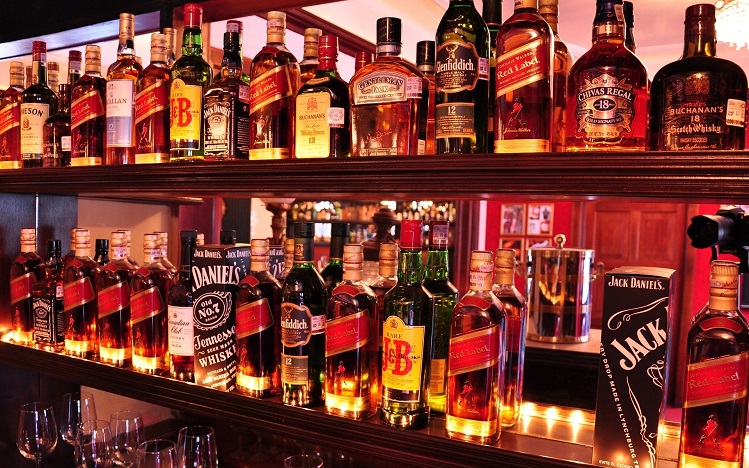Whisky, often referred to as the "golden elixir," possesses a mystique that has captivated connoisseurs and enthusiasts for centuries. From its humble origins in the monastic distilleries of medieval Europe to its status today as a symbol of sophistication and craftsmanship, whisky has woven itself into the fabric of cultures around the world. This amber-hued spirit has a power to transport, to evoke memories, and to facilitate connections among individuals from all walks of life.
The allure of whisky lies not only in its rich history, but also in its intricate production process. From carefully selecting the grains and malting the barley to age-old distillation techniques and the art of barrel aging, every step contributes to the creation of a distinct and complex flavor profile. The diversity within the world of whisky is remarkable, with each region and distillery leaving their unique imprint on the final product. Whether it be the peaty and smoky notes of Islay’s single malts or the smooth and honeyed character of a Speyside dram, there is a whisky for every palate and occasion.
Join us on an exploration of this enigmatic world, where we will delve into the origins of whisky, uncover the secrets behind its production, and immerse ourselves in its rich tapestry of flavors and aromas. From unravelling the myths and legends that surround this revered spirit to discovering the intricacies of tasting and appreciating its nuances, we will embark on a journey that will open your senses to the wonders of whisky. So, raise a glass and let us venture into the world of whisky, where tradition, craftsmanship, and passion converge to create an experience like no other.
History of Whisky
Whisky, also known as whiskey in some regions, has a rich and fascinating history. It has been enjoyed by people all over the world for centuries. The origins of whisky can be traced back to ancient times, where it was first discovered and perfected by the resourceful and creative minds of our ancestors.
The exact origins of whisky are disputed, but it is widely believed to have originated in either Ireland or Scotland. Both countries lay claim to being the birthplace of this beloved spirit. The art of distilling whisky was likely introduced to these lands by monks who had traveled from the Mediterranean region, where the process was already well-known.
In the early days, whisky was primarily used for medicinal purposes. Monks and other scholarly figures believed in its ability to cure ailments and prolong life. As the popularity of whisky spread, it began to be appreciated for its qualities as a recreational drink as well. It became a symbol of celebration and bonding, bringing people together in festive occasions and intimate gatherings.
Over the centuries, whisky production techniques evolved and improved. The introduction of oak barrels for aging greatly influenced the flavor and character of this spirit. Distilleries popped up in various parts of the world, each contributing their unique styles and techniques to the world of whisky. Today, whisky is produced in different countries, including the United States, Canada, Japan, and many others, each with its own distinct traditions and flavors.
The history of whisky is a testament to the human ingenuity and the quest for pleasure and enjoyment. It has stood the test of time and continues to captivate the hearts and palates of people from all walks of life. Whether enjoyed neat, on the rocks, or in a delightful cocktail, whisky remains a beloved and cherished spirit, carrying with it the stories and traditions of generations past.
Whisky Production Process
Malting: The production of whisky begins with malting, a process where barley grains are soaked in water and allowed to germinate. After germination, the barley is dried using hot air, and this malted barley forms the basis for whisky production.
Mashing: In the next stage, the malted barley is ground into a coarse meal called grist, which is then mixed with hot water in a large vessel known as a mash tun. The hot water helps to extract the soluble sugars from the barley, forming a mixture known as the mash.
Fermentation: Once the mash is ready, it is transferred to fermentation vessels. Here, yeast is added to the mash, initiating a chemical reaction known as fermentation. During this process, the yeast converts the sugars in the mash into alcohol, producing a liquid called "wash" with an alcoholic content similar to that of beer.
*Please note that the whisky production process involves additional steps not mentioned above.
Types and Tasting Notes
Whisky comes in various types, each with its own distinct characteristics and flavors. From smoky and peaty expressions to smooth and fruity drams, there is a whisky for every palate. Let’s explore some of the most popular types and their tasting notes.
Scotch Whisky: This iconic spirit hails from Scotland and is renowned for its rich heritage and dynamic flavor profiles. Single malt Scotch whisky, made exclusively from malted barley in a single distillery, offers a range of tastes, from delicate floral and honey notes to robust smokiness with hints of seaside saltiness. Blended Scotch whisky combines different malt and grain whiskies, resulting in a harmonious blend of flavors, including mellow fruitiness, spiciness, and a touch of vanilla.

Bourbon: Originating from the United States, bourbon whiskey is known for its sweetness and smoothness. Made primarily from corn, it often exhibits flavors of caramel, vanilla, and oak, with a hint of spice. The aging process in new charred oak barrels imparts a distinct richness and complexity to this beloved American whiskey.
Irish Whiskey: Irish whiskey is famous for its triple distillation, a method that lends it exceptional smoothness. It showcases a range of flavors, from light and floral to rich and creamy. Tasting notes often include gentle fruitiness, honey, toasted grains, and a touch of spice. Irish whiskey can be enjoyed neat, on the rocks, or in classic whiskey cocktails.
Macallan Edition 1
Whether you prefer the smoky allure of Scotch, the sweet and mellow nature of bourbon, or the smooth elegance of Irish whiskey, exploring the diverse world of whisky promises an adventure for your taste buds. Take your time to discover the nuances and intricacies of each type, and savor the golden elixir in all its marvelous forms. Cheers!


